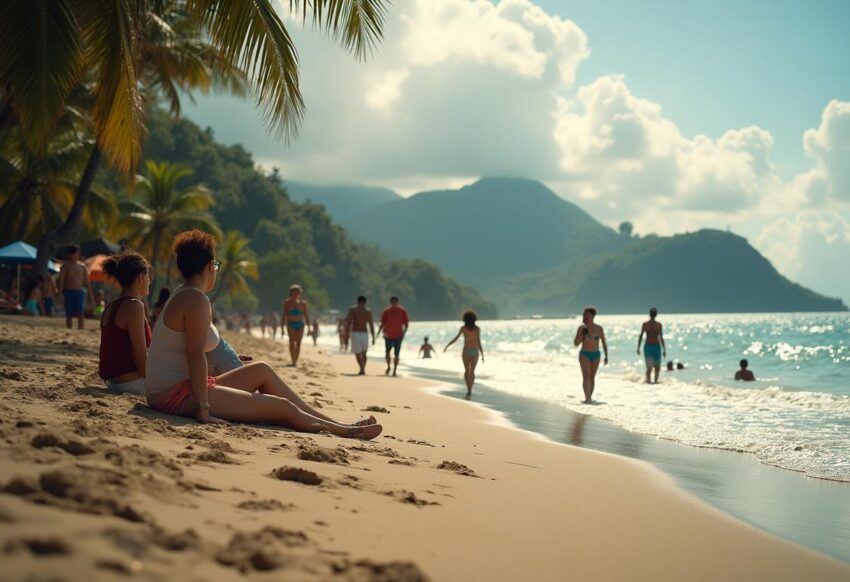Saturday, August 2, 2025

The Canadian government has updated its travel advisory for Costa Rica, urging citizens to “exercise a high degree of caution” due to increasing worries about violent crime and petty theft in popular tourist spots. This advisory was published on July 31, 2025, on the official Travel.gc.ca website. It warns travelers about a rise in criminal activities, including theft, armed robbery, and assault, especially in areas that attract international visitors.
Costa Rican authorities, however, insist that the rise in crime does not pose a direct threat to the tourism industry, which is crucial to the country’s economy. Despite these reassurances, the updated travel advisory points out that growing fears about safety could harm Costa Rica’s reputation as a safe destination for travelers.
Rising Crime in Tourist Areas
The updated travel warning follows reports of increased crime aimed at tourists. Areas like San José, Jacó, Manuel Antonio, Santa Teresa, and the Caribbean coast—including Puerto Viejo and Limón—are highlighted as high-risk zones. The warning states that organized criminal gangs often target tourists by working in teams to distract and rob them, especially in busy places like transportation hubs, hotel lobbies, restaurants, and beaches.
Besides violent crimes, the advisory also points out vehicle thefts, card fraud, and the risks tied to consuming tainted alcohol or contaminated food and drinks. These issues have become more pressing as the country faces a rise in both violent and petty crimes.
The Canadian government’s advisory is part of a larger trend observed in reports from other countries, including the United States and the United Kingdom. These countries have also cautioned their citizens about the dangers of traveling to Costa Rica, particularly in popular tourist areas.
Costa Rican Government’s Response
In light of rising crime concerns, Costa Rican officials, including Security Minister Mario Zamora, have played down the risks to tourism. They stress that there is no direct threat to visitors. Minister Zamora recently said, “Insecurity is not affecting tourism,” and reaffirmed that Costa Rica is still a safe destination for foreign visitors. He added that many homicides in Costa Rica are linked to drug gang conflicts and do not involve tourists.
The Costa Rican government is increasing police presence in busy tourist areas to protect visitors. Zamora urged the public not to give in to panic, assuring that the country’s efforts to maintain its image as a peaceful and nature-filled destination continue to be strong.
Global Concerns Over Crime Impacting Tourism
While Costa Rican officials remain hopeful about tourism safety, the effects of travel advisories are significant. Security experts and tourism consultants agree that the perception of insecurity, even if it doesn’t directly affect tourists, can lead to serious economic impacts. The travel sector, especially tourism, is very sensitive to perceptions of risk, and official warnings from foreign governments shape public opinion.
Daniel Vargas, a tourism consultant, noted, “Tourism is a sector that is extremely sensitive to the perception of risk. Although objective data show that tourists are not frequent victims of extreme violence, official warnings from foreign governments do carry significant weight.” This highlights the need to manage safety perceptions, as even minor signs of danger can result in fewer bookings and reduced tourism activity.
Risks in Popular Tourist Destinations
The Canadian travel advisory identifies high-traffic areas like San José, Jacó, and the Caribbean coast as the most vulnerable locations for tourists, where organized gangs tend to operate. These gangs often use various methods to distract tourists and steal their belongings, particularly in crowded places. The advisory emphasizes that tourists should stay alert when visiting well-known attractions and avoid carrying large amounts of cash or valuable items.
The advisory also mentions that tourists should be cautious in hotels and transportation hubs, which are common crime spots for theft and fraud. Additionally, the risk of encountering contaminated food and drinks, especially in less regulated establishments, is a concern for visitors.
Costa Rica’s Tourism Impact and Economic Concerns
Costa Rica is one of the most popular tourist spots in Central America, attracting millions of visitors each year to its beaches, rainforests, and national parks. The tourism sector is vital to the country’s economy, and any negative perception of safety can significantly impact local businesses and jobs.
Despite government reassurances, tourism experts warn that ongoing security issues could harm Costa Rica’s international reputation. The country is famous for its “pura vida” lifestyle and peaceful atmosphere, but any rise in violent crime can weaken its image as a safe and welcoming destination.
Increased media focus on safety issues may lead travelers to consider other destinations or delay their trips. This change could result in lower income for local hotels, tour operators, and other tourism services. To maintain its position as a leading tourist location, Costa Rica must ensure the safety of its citizens and visitors.
Conclusion: Managing Perception and Realities of Crime
Costa Rica’s updated travel advisory from the Canadian government highlights the delicate balance between how we see safety and the actual situation for tourists. While the government assures that the risks do not directly threaten tourists, the increased media attention on crime and advisories from foreign governments show the need to manage both real and perceived safety risks.
Travelers planning to visit Costa Rica should stay informed and be careful in high-risk areas. Tourists need to stay alert, especially in crowded places, and follow local safety guidelines to make sure their visit is enjoyable and safe. As Costa Rica aims to maintain its reputation as a peaceful destination filled with nature, it must address rising security concerns to protect its standing in the global tourism market.
(Source: Canadian Government, Costa Rica Travel Advisory, Costa Rica Tourism, Security Updates, Travel Safety, International Travel Warnings)







